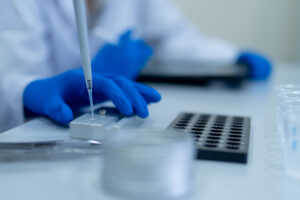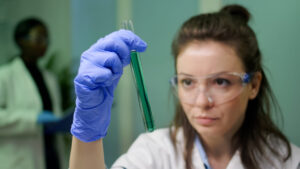Genetic testing for a baby may occur either before or after birth. We explore why genetic testing of a baby may be recommended, and when.
There are several cases when genetic testing of a baby might be recommended. Any parents, or parents-to-be, considering embarking down the route of undergoing genetic testing for their baby, either before or after birth, should first consult with a genetic counselor.
Meeting with a genetic counselor is important to understand which specific genetic testing might be recommended, what the testing will entail, and what the results might identify, and what this might mean for the health of their baby both in the short and long term.
Family medical history
Genetic testing may be recommended for a baby, either before or after birth, if there is a family history of rare disease.
One or both parents may already have been identified as carriers of a specific gene mutation, in which case genetic testing would be highly recommended for their baby.
A baby, with an older sibling or parent with a rare disease diagnosis themselves, would also be a priority candidate for genetic testing to rule out or diagnose a rare disease.
In other cases, unexplainable similar symptoms in family members, might also trigger concerns about the genetic health of a baby, and lead to genetic testing.
Prenatal testing
Genetic screening of a baby is now increasingly common before birth. This includes testing that is a part of standard prenatal care for pregnant women, testing that is recommended due to higher maternal age, or due to a possible physical symptom of a rare disease having been identified by ultrasound or other testing methods.
Testing for Down syndrome, is standard within most prenatal care, for example. The nuchal translucency test is carried out at around 12 weeks of pregnancy and involves measuring the fluid at the back of the neck of the developing baby, combined with a blood sample from the Mother. This test identifies a baby’s potential risk for being born with Down syndrome.
Amniocentesis, is another form of genetic testing for a baby that takes place prenatally. It involves taking a sample of amniotic fluid from around the baby, to identify if the infant is at risk of developing a rare disease.
Newly developed non-invasive prenatal tests are now available for parents-to-be to learn more about their unborn child’s genetic health. As these tests improve in accuracy and accessibility, they are increasingly popular amongst parents-to-be, and even amongst those with no identified risk factors for a rare disease in their infant.
Newborn screening
In the US, for example, all newborns undergo genetic testing at birth. A few drops of blood are taken from the heel. Genetic screening in a newborn is used to identify if the newborn has any one of up to 50 genetic disorders, including phenylketonuria (PKU), sickle cell disease, and hypothyroidism.
Symptoms
Genetic testing for a baby may also be recommended if an infant shows signs or features of a rare disease. This might include unique facial features, affecting the shape and size of their eyes, nose, mouth, ears, chin, and forehead.
It might also include concerns about developmental delays in a baby- delays in their gross motor, cognitive, and speech development, might also trigger genetic testing to identify or rule out a genetic cause of the delay. Concerns about a baby’s behavior might also lead to a recommendation for further testing as well.
The options
Advancements in AI technology are also pioneering a new form of genetic analysis, involving the use of facial screening technology to identify potential facial features or markers of a rare disease, in an infant. This can be a non-invasive, easily accessible method to understand better if an infant is at risk for a genetic syndrome, and if more targeted genetic testing is required for a diagnosis.
Genetic testing for a baby may take many different forms, and be prompted by many varying reasons. Genetic counseling is essential for understanding the reasons for testing and the types of testing available.
Use our Family Health Checker app to assess developmental delays and potential genetic concerns at home. The app helps analyze your child’s development and identify early red flags. Plus, the “Connect to Expert” feature offers personalized support from genetic professionals. Together, these resources empower you to support your child’s unique developmental journey proactively.



